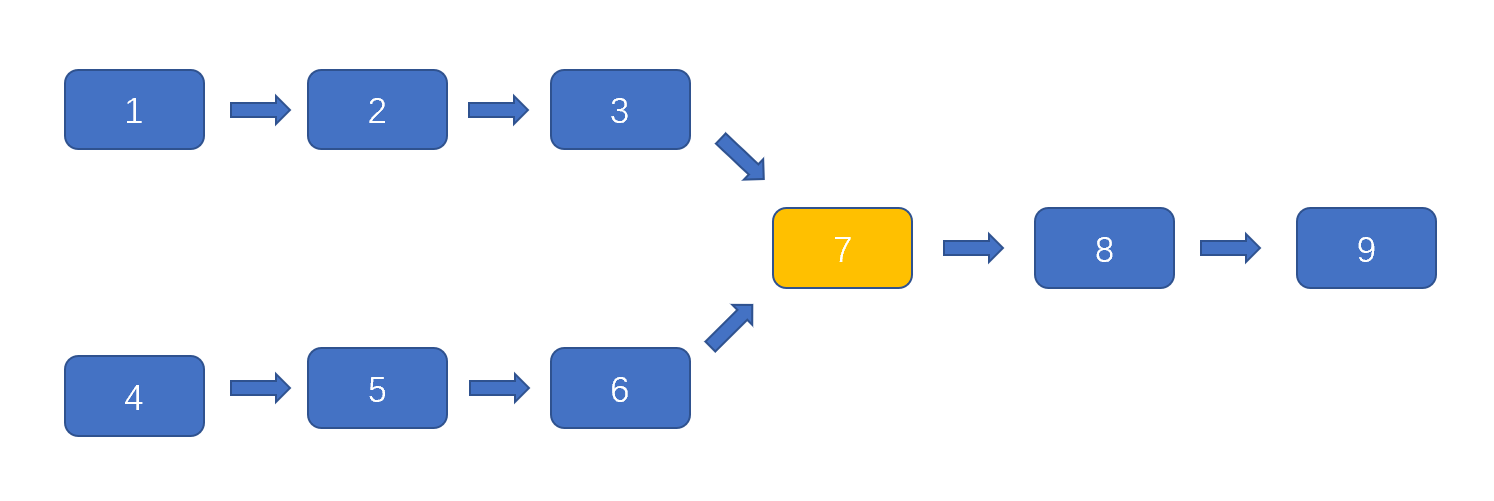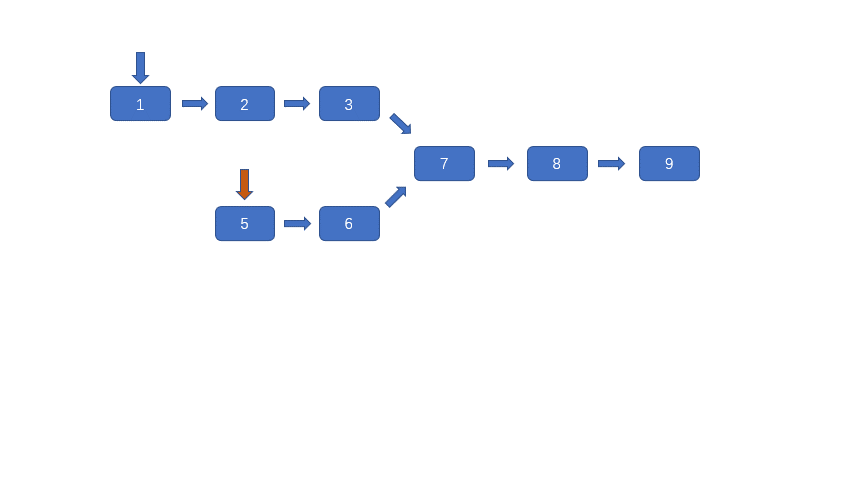> 如果阅读时,发现错误,或者动画不可以显示的问题可以添加我微信好友 **[tan45du_one](https://raw.githubusercontent.com/tan45du/tan45du.github.io/master/个人微信.15egrcgqd94w.jpg)** ,备注 github + 题目 + 问题 向我反馈
>
> 感谢支持,该仓库会一直维护,希望对各位有一丢丢帮助。
>
> 另外希望手机阅读的同学可以来我的 [**公众号:袁厨的算法小屋**](https://raw.githubusercontent.com/tan45du/test/master/微信图片_20210320152235.2pthdebvh1c0.png) 两个平台同步,想要和题友一起刷题,互相监督的同学,可以在我的小屋点击[**刷题小队**](https://raw.githubusercontent.com/tan45du/test/master/微信图片_20210320152235.2pthdebvh1c0.png)进入。
#### [剑指 Offer 52. 两个链表的第一个公共节点](https://leetcode-cn.com/problems/liang-ge-lian-biao-de-di-yi-ge-gong-gong-jie-dian-lcof/) & [160. 相交链表](https://leetcode-cn.com/problems/intersection-of-two-linked-lists/)
### 前言
今天给大家带来一个不是那么难的题目,这个题目的解答方法很多,只要能AC的就是好方法,虽然题目不是特别难但是也是剑指offer上的经典题目所以大家要记得打卡呀。
然后今天我们的链表板块就算结束啦。周末的时候我会对链表的题目做一个总结,俗话说温故而知新嘛。好啦废话不多说,我们一起来看一下今天的题目吧!
题目描述:
输入两个链表,找出它们的第一个公共节点。如下图,返回黄色结点即可。

题目表达是不是也很简单,这个题目我的方法一共有两个,一种就是用HashSet进行存储,一种就是利用双指针,大家有更好的可以在下面讨论呀。
### HashSet
这个方法是比较简单的,主要思路就是,先遍历一个链表将链表的所有值都存到Hashset中,然后再遍历另一个链表,如果发现某个结点在Hashset中已经存在那我们直接返回该节点即可,代码也很简单。
**题目代码**
Java Code:
```java
public class Solution {
public ListNode getIntersectionNode (ListNode headA, ListNode headB) {
ListNode tempa = headA;
ListNode tempb = headB;
//定义Hashset
HashSet arr = new HashSet();
//遍历链表A,将所有值都存到arr中
while (tempa != null) {
arr.add(tempa);
tempa = tempa.next;
}
//遍历列表B,如果发现某个结点已在arr中则直接返回该节点
while (tempb != null) {
if (arr.contains(tempb)) {
return tempb;
}
tempb = tempb.next;
}
//若上方没有返回,此刻tempb为null
return tempb;
}
}
```
C++ Code:
```cpp
class Solution {
public:
ListNode * getIntersectionNode(ListNode *headA, ListNode *headB) {
ListNode * tempa = headA;
ListNode * tempb = headB;
//定义Hashset
set arr;
//遍历链表A,将所有值都存到arr中
while (tempa != nullptr) {
arr.insert(tempa);
tempa = tempa->next;
}
//遍历列表B,如果发现某个结点已在arr中则直接返回该节点
while (tempb != nullptr) {
if (arr.find(tempb) != arr.end()) {
return tempb;
}
tempb = tempb->next;
}
//若上方没有返回,此刻tempb为null
return tempb;
}
};
```
JS Code:
```js
var getIntersectionNode = function(headA, headB) {
let tempa = headA;
let tempb = headB;
//定义Hashset
let arr = new Set();
//遍历链表A,将所有值都存到arr中
while (tempa) {
arr.add(tempa);
tempa = tempa.next;
}
//遍历列表B,如果发现某个结点已在arr中则直接返回该节点
while (tempb) {
if (arr.has(tempb)) {
return tempb;
}
tempb = tempb.next;
}
//若上方没有返回,此刻tempb为null
return tempb;
};
```
Python Code:
```python
class Solution:
def getIntersectionNode(self, headA: ListNode, headB: ListNode) -> ListNode:
tempa = headA
tempb = headB
# 定义Hashset
arr = set()
# 遍历链表A,将所有值都存到arr中
while tempa is not None:
arr.add(tempa)
tempa = tempa.next
# 遍历列表B,如果发现某个结点已在arr中则直接返回该节点
while tempb is not None:
if tempb in arr:
return tempb
tempb = tempb.next
# 若上方没有返回,此刻tempb为null
return tempb
```
Swift Code:
```swift
class Solution {
func getIntersectionNode(_ headA: ListNode?, _ headB: ListNode?) -> ListNode? {
var tempa = headA
var tempb = headB
var arr:Set = []
//遍历链表A,将所有值都存到arr中
while tempa != nil {
arr.insert(tempa!)
tempa = tempa?.next
}
//遍历列表B,如果发现某个结点已在arr中则直接返回该节点
while tempb != nil {
if arr.contains(tempb!) {
return tempb
}
tempb = tempb?.next
}
//若上方没有返回,此刻tempb为null
return tempb
}
}
extension ListNode: Hashable, Equatable {
public func hash(into hasher: inout Hasher) {
hasher.combine(val)
hasher.combine(ObjectIdentifier(self))
}
public static func ==(lhs: ListNode, rhs: ListNode) -> Bool {
return lhs === rhs
}
}
```
下面这个方法比较巧妙,不是特别容易想到,大家可以自己实现一下,这个方法也是利用我们的双指针思想。
下面我们直接看动图吧,特别直观,一下就可以搞懂。

是不是一下就懂了呀,我们利用双指针,当某一指针遍历完链表之后,然后掉头去另一个链表的头部,继续遍历。因为速度相同所以他们第二次遍历的时候肯定会相遇,是不是很浪漫啊!
**题目代码**
Java Code:
```java
public class Solution {
public ListNode getIntersectionNode (ListNode headA, ListNode headB) {
//定义两个节点
ListNode tempa = headA;
ListNode tempb = headB;
//循环
while (tempa != tempb) {
//如果不为空就指针下移,为空就跳到另一链表的头部
tempa = tempa != null ? tempa.next: headB;
tempb = tempb != null ? tempb.next: headA;
}
return tempa;//返回tempb也行
}
}
```
C++ Code:
```cpp
class Solution {
public:
ListNode * getIntersectionNode(ListNode *headA, ListNode *headB) {
//定义两个节点
ListNode * tempa = headA;
ListNode * tempb = headB;
//循环
while (tempa != tempb) {
//如果不为空就指针下移,为空就跳到另一链表的头部
tempa = tempa != nullptr ? tempa->next: headB;
tempb = tempb != nullptr ? tempb->next: headA;
}
return tempa;//返回tempb也行
}
};
```
JS Code:
```js
var getIntersectionNode = function(headA, headB) {
//定义两个节点
let tempa = headA;
let tempb = headB;
//循环
while (tempa != tempb) {
//如果不为空就指针下移,为空就跳到另一链表的头部
tempa = tempa != null ? tempa.next: headB;
tempb = tempb != null ? tempb.next: headA;
}
return tempa;//返回tempb也行
};
```
Python Code:
```python
class Solution:
def getIntersectionNode(self, headA: ListNode, headB: ListNode) -> ListNode:
# 定义两个节点
tempa = headA
tempb = headB
# 循环
while tempa is not tempb:
# 如果不为空就指针下移,为空就跳到另一链表的头部
tempa = tempa.next if tempa is not None else headB
tempb = tempb.next if tempb is not None else headA
return tempa # 返回tempb也行
```
Swift Code:
```swift
class Solution {
func getIntersectionNode(_ headA: ListNode?, _ headB: ListNode?) -> ListNode? {
//定义两个节点
var tempa = headA
var tempb = headB
//循环
while tempa != tempb {
// 如果不为空就指针下移,为空就跳到另一链表的头部
tempa = tempa != nil ? tempa?.next : headB
tempb = tempb != nil ? tempb?.next : headA
}
return tempa //返回tempb也行
}
}
```
好啦,链表的题目就结束啦,希望大家能有所收获,下周就要更新新的题型啦,继续坚持,肯定会有收获的。
> 贡献者[@jaredliw](https://github.com/jaredliw)注:
>
> 在这里带大家来看看一些其他的解题方法,虽然没有双指针有效,但还是值得一试。
>
> 1. 两个链表各遍历一次,找出长度。根据长度差k,让较长的那个链表先走k步。之后再两个指针一起走,由于起点一样,两个指针必将一起到达公共节点。
> 2. 将其中一条链表的头和尾相连,公共节点就是环的入口,直接套用之前学过的算法就可以啦。(这解法看得我拍腿叫好)